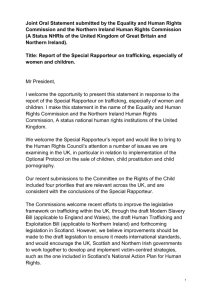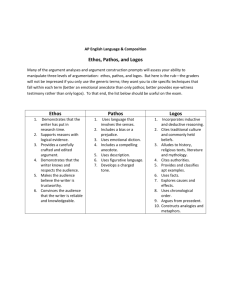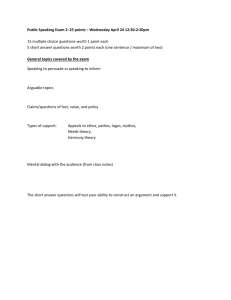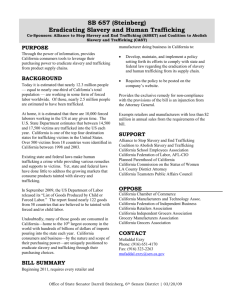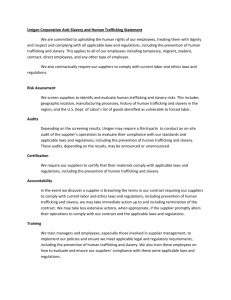File - MHS Common Core English Language
advertisement
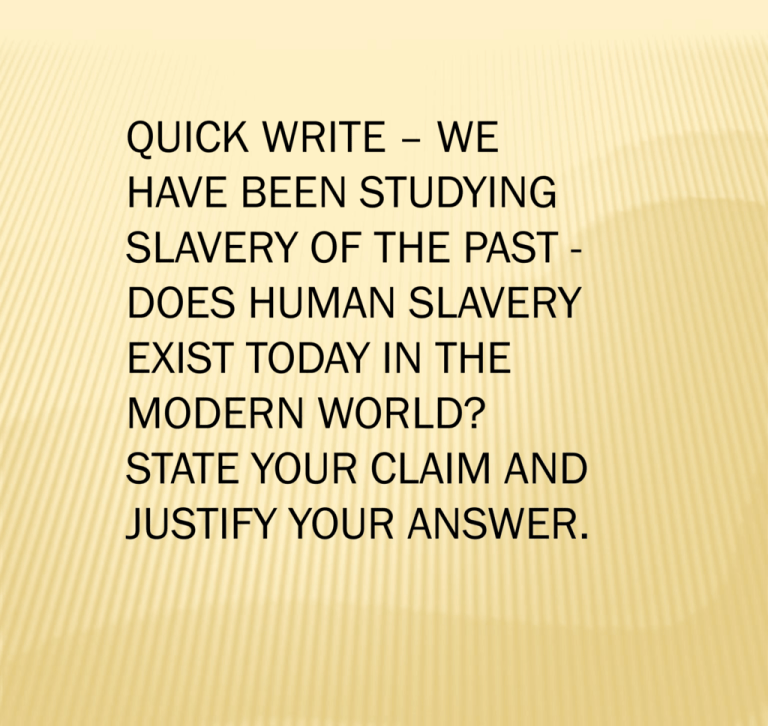
QUICK WRITE – WE HAVE BEEN STUDYING SLAVERY OF THE PAST DOES HUMAN SLAVERY EXIST TODAY IN THE MODERN WORLD? STATE YOUR CLAIM AND JUSTIFY YOUR ANSWER. Learning Goal: By the end of today's lesson all students will state five facts about human trafficking. By the end of the complete lesson students will create a project that demonstrates their understanding of human trafficking and its connection to American slavery of the past. We will be using the CRAAP test to verify the credibility of sources – locate appropriate websites to study this issue Day 1 Start Up: Read the definition of Human Trafficking and then take the truefalse quiz! Human Trafficking: The organized criminal activity in which human beings are treated as possessions to be controlled and exploited (as by being forced into prostitution or involuntary labor) Pair-Share! Partner A, share your answers first. Partner B, share your answers second. Pick one question and discuss why you felt the answer was true/false. Human Trafficking Video NOW - Watch the video to learn some of the facts about Human Trafficking – Check your quiz to see if you want to change any of your answers False - It happens all over the U.S. too! False - 2nd largest (tied with illegal gun sales) False - the total is 32 BILLION! True True Discussion: Did any of the answers on the quiz surprise you? Why or why not? Yes because... No because... You need: 1. This packet 2. A pen or pencil 3. A highlighter Task: You will read an article about human trafficking by Nicholas Kristof, a New York Times colonist who has made human trafficking one of the focal points of his work. As your read the article, look for and highlight the answers to the questions on the worksheet. Once you find an answer, go back and record your answer on the worksheet. Task: Read the article Highlight answers to questions 1-5 Record answers on your worksheet Be prepared to share your answers! Think again – The New York Times should be a trusted source of information and maybe it still is BUT some new information has come out about Somaly Mam. Read the latest information on Somaly Mam and what the original author of the New York Times article says about this source today! How does this new information effect your opinion of Somaly Mam’s story? Does this new information make Somaly Mam’s story still credible? not credible? less credible? Explain – make a claim and use evidence from the two articles to support your opinion REVISIT THE DEFINITION FOR HUMAN TRAFFICKING – The organized criminal activity in which human beings are treated as possessions to be controlled and exploited DISCUSS WITH YOUR PARTNER – HUMANS ARE NOT ONLY TRAFFICKED FOR SEX. WHAT MIGHT BE SOME OTHER WAYS THAT HUMANS ARE CONTROLLED AND EXPLOITED? There are always two sides to every story. Today you are going to look at two sides of one issue and decide which writer was more persuasive – consider things like their use of ethos, pathos, and logos. Which writer do you trust more? Why? Which writer makes you feel? Feel what? Which writer had more convincing evidence? Explain. Consider their writing – which piece was better written in terms of style (think about their vocabulary, sentences, use of parallel structure, imagery, rhetorical questions, etc.). SIDE ONE Watch the video and listen to the author’s claim. Pay attention to and take notes on the author’s claim, use of ethos, logos, pathos, and style. You will use these notes later when you write about which piece was more persuasive Sweat Shops Video SIDE TWO Now read the article. Note the author’s claim. Take notes on their use of ethos, logos, pathos and style. You will use these notes to help you write about which piece was more effective. WHICH PIECE WAS MORE PERSUASIVE? BASE YOUR OPINION SOLELY ON HOW WELL EACH WRITER USED ETHOS, LOGOS, PATHOS AND STYLE (LIKE PARALLEL STRUCTURE, IMAGERY, WORD CHOICE, ALLUSIONS, RHETORICAL QUESTIONS, ETC.). USE EVIDENCE FROM EACH PIECE TO SUPPORT YOUR RESPONSE. ONCE YOU HAVE EXAMINED EACH SIDE – NOW YOU MAY OFFER YOUR OPINION ABOUT THIS ISSUE. Start Up: 1. Login to your computer 2. Create a new google presentation Learning Goal: By the end of the lesson all students will create a presentation after researching human trafficking (or modern day slavery) based on their research. Agenda: Start Up (3 min) Project Overview (5 min) Work on project (40 min) Clean Up/Review (2 min) All partner A's will be assigned Group 1 All partner Bs will be assigned to group 2! Teacher's note: If you want the students to have access to the links, upload the document to your website (or however you want them to access it). Access this document on my website! Task: 1. Create a google presentation answering all of the overview questions. 2. Your presentation should be a minimum of 7 slides! 1. Title slide 2. Question 1 3. Question 2 4. Question 3 5. Question 4 6. Question 6 OR additional information 7. Works Cited slide You will have today and part of tomorrow to create/finalize your slides. You will share your presentation with me. You will then present your slides to your partner! Task: 1. Create a google presentation answering all of the overview questions. 2. Your presentation should be a minimum of 7 slides! 1. Title slide 2. Question 1 3. Question 2 4. Question 3 5. Question 4 6. Question 6 OR additional information 7. Works Cited slide You will have today and part of tomorrow to create/finalize your slides. You will share your presentation with me. You will then present your slides to your partner! Rename your google presentation: Human Trafficking Your Last Name Your Period Learning Goal: By the end of the lesson all students will create a presentation after researching human trafficking (or modern day slavery) based on their research. Day 3 My ideas on day 3 1. Students complete/finalize their slides (15 min) 2. Students share their presentations with the teacher 3. Students present their slides to their partner. Partner uses the questions from the opposite group to fill in a worksheet (with the same questions) and turn that in to show they followed the presentation. This will cut down on time needed to conduct presentations. (Or you can do it the traditional way if you have time).


